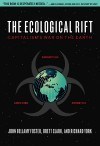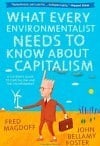Ecology
Considerations of Environmental Protection Criteria for Radioactive Waste, U.S. Environmental Protection Agency, Office of Radiation Programs, Waste Environmental Standards Program, Washington, D.C. 20460, February 1978.
Most government reports make dull reading, and this one is no exception. But it contains a message which needs to be taken in by everyone even minimally concerned about the future of the human race. That message, quite simply, is that there is not and cannot be a safe program for disposing of radioactive wastes. The reasons are basically simple, do not depend on any complicated scientific arguments, and cannot be refuted or made irrelevant by any conceivable increase in scientific knowledge or technological capability. They can be summed up in a series of quotations from the report. | more…
When I was a boy I always assumed that I would grow up to be both a scientist and a Red. Rather than face a problem of combining activism and scholarship, I would have had a very difficult time trying to separate them. | more…
Isador Nabi is widely believed to have emerged from the swamps of southern Vermont some time in the 1970s. The first written record of him was a short-lived biography in American Men of Science. Then he seems to have dissolved. But it is said that he is a sort of academic Golem and that whenever greed, obscurantism, careerism, reductionism, and opportunism afflict science, that is, most of the time, he condenses again out of hypothetico-deductive dust in some obscure vault in that library where they bury unread dissertations, and he lurks in and around academia spending his rage in jest. An unsuccessful obituary appeared in Nature in 1981. Since then he has been nominated (by himself) eleven times for the Grammy and his works have been retranslated into English from 116 foreign languages that didn’t want them. | more…
The introduction to this book, the last part to be completed, was sent to the printer in New York City only days before the attacks on the World Trade Center on September 11, 2001, and was first published in October 2001 in Monthly Review. Since then the world has witnessed a continuing war by the United States for control of the oil-rich Middle East and an acceleration of the global ecological crisis—symbolized above all by global warming. The opening years of the twenty-first century can therefore be viewed as marking a new stage in the war of capitalism on the planet. | more…

Humanity in the twenty-first century is facing what might be described as its ultimate environmental catastrophe: the destruction of the climate that has nurtured human civilization and with it the basis of life on earth as we know it. All ecosystems on the planet are now in decline. Enormous rifts have been driven through the delicate fabric of the biosphere. The economy and the earth are headed for a fateful collision—if we don’t alter course. | more…

There is a growing consensus that the planet is heading toward environmental catastrophe: climate change, ocean acidification, ozone depletion, global freshwater use, loss of biodiversity, and chemical pollution all threaten our future unless we act. What is less clear is how humanity should respond. The contemporary environmental movement is the site of many competing plans and prescriptions, and composed of a diverse set of actors, from militant activists to corporate chief executives. | more…
As John Bellamy Foster explained in “The Ecology of Destruction” (Monthly Review, February 2007), Marx explored the ecological contradictions of capitalist society as they were revealed in the nineteenth century with the help of the two concepts of metabolic rift and metabolic restoration. The metabolic rift describes how the logic of accumulation severs basic processes of natural reproduction leading to the deterioration of ecological sustainability. Moreover, “by destroying the circumstances surrounding that metabolism,” Marx went on to argue, “it [capitalist production] compels its systematic restoration as a regulating law of social reproduction”—a restoration, however, that can only be fully achieved outside of capitalist relations of production | more…
Our friends Leo Panitch and Colin Leys, editors of the Socialist Register, have recently published Coming to Terms with Nature: Socialist Register, 2007 (Monthly Review Press, 2006), which includes contributions by a distinguished group of analysts addressing crucial environmental issues—dealing with everything from “fossil capitalism” to eco-localism | more…
I would like to begin my analysis of what I am calling here “the ecology of destruction” by referring to Gillo Pontecorvo’s 1969 film Burn!. Pontecorvo’s epic film can be seen as a political and ecological allegory intended for our time. It is set in the early nineteenth century on an imaginary Caribbean island called “Burn.” Burn is a Portuguese slave colony with a sugar production monoculture dependent on the export of sugar as a cash crop to the world economy. In the opening scene we are informed that the island got its name from the fact that the only way that the original Portuguese colonizers were able to vanquish the indigenous population was by setting fire to the entire island and killing everyone on it, after which slaves were imported from Africa to cut the newly planted sugar cane. | more…

Capital, as Marx once wrote, comes into the world “dripping from head to foot, from every pore, with blood and dirt.” He might well have been describing the long, grim history of rubber. From the early stages of primitive accumulation to the heights of the industrial revolution and beyond, rubber is one of a handful of commodities that has played a crucial role in shaping the modern world, and yet, as John Tully shows in this remarkable book, laboring people around the globe have every reason to regard it as “the devil’s milk.” All the advancements made possible by rubber—industrial machinery, telegraph technology, medical equipment, countless consumer goods—have occurred against a backdrop of seemingly endless exploitation, conquest, slavery, and war. But Tully is quick to remind us that the vast terrain of rubber production has always been a site of struggle, and that the oppressed who toil closest to “the devil’s milk” in all its forms have never accepted their immiseration without a fight. | more…
In late November 2006 John Bellamy Foster traveled to Brazil where he delivered addresses on the global ecological devastation of capitalism, and the need for worldwide ecosocialist resistance, at two universities in the state of Santa Catarina: the Regional University of Blumenau and the Federal University of Santa Catarina in Florianópolis. These talks were part of the third annual Bolivarian Days Conference organized by the Institute of Latin American Studies in Brazil. The theme this year was “Social Theory and Eurocentrism in Latin America: The Insurgency of Critical Thought.” The conference provided ample evidence of the vitality of socialist and anti-imperialist critiques both in Brazil and in Latin America as a whole in what is clearly a new era of revolt | more…
Paul Burkett’s new book, Marxism and Ecological Economics, offers in an outstanding manner evidence of the treasures in Marx’s “Critique of Political Economy” and of the riches of Marxist theory accumulated in more than a hundred years of theoretical reasoning. It is an attempt to bring Marx into the new economic subdiscipline of ecological economics…, and at the same time to reexamine Marxist theory from the perspective of ecological economics.… Burkett’s book aims at correcting…widespread, if not altogether dominant interpretations, which are fundamentally flawed—in both their theoretical understandings of Marxism and their attempts to reduce its influence to certain failed historical experiments. | more…


